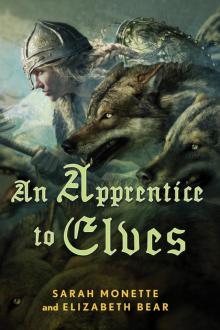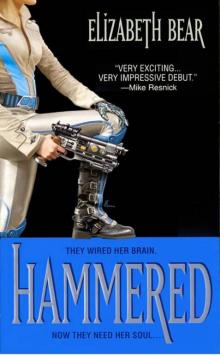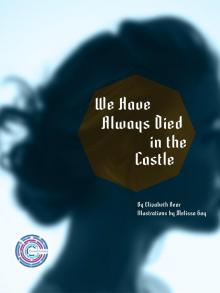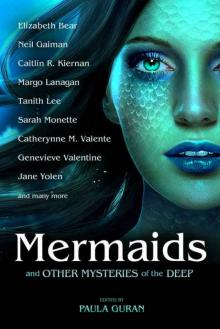- Home
- Elizabeth Bear
New Cthulhu 2: More Recent Weird Page 4
New Cthulhu 2: More Recent Weird Read online
Page 4
She could feel it now, the channels open and her deepest intuition rising: This was the worst place she’d ever been, and she couldn’t tell which side bore the greater blame.
With breakfast in her belly and coffee in hand, she met Escovedo at his office, so he could escort her to the corner of the island where the prison stood facing west, looking out over the sea. There would be no more land until Asia. Immense, made of brick so saturated with wet air that its walls looked slimed, the prison emerged from the mist like a sunken ship.
What would it be like, she wondered, to enter a place and not come out for seventy years? What would that do to one’s mind? Were they even sane now? Or did they merely view this as a brief interruption in their lives? Unless they were murdered outright—a possibility—their lifespans were indefinite. Maybe they knew that time was their ally. Time would kill their captors, generation by generation, while they went on. Time would bring down every wall. All terrestrial life might go extinct, while they went on.
As long as they could make it those last few dozen yards to the sea.
“Have any of them ever escaped from here?” she asked.
“No.”
“Don’t you find that odd? I do. Hasn’t most every prison had at least one escape over seventy years?”
“Not this one. It doesn’t run like a regular prison. The inmates don’t work. There’s no kitchen, no laundry trucks, no freedom to tunnel. They don’t get visitors. We just spend all day looking at each other.” He paused in the arched, inset doorway, his finger on the call button that would summon the guards inside to open up. “If you want my unfiltered opinion, those of us who pulled this duty are the real prisoners.”
Inside, it was all gates and checkpoints, the drab institutional hallways saturated with a lingering smell of fish. Them, she was smelling them. Like people who spent their workdays around death and decay, the soldiers here would carry it home in their pores. You had to pity them that. They would be smelling it after a year of showers, whether it was there or not.
Stairs, finally, a series of flights that seemed to follow the curvature of some central core. It deposited them near the top of the building, on an observation deck. Every vantage point around the retaining wall, particularly a trio of guard posts, overlooked an enormous pit, like an abandoned rock quarry. Flat terraces and rounded pillows of stone rose here and there out of a pool of murky seawater. Along the walls, rough stairways led up to three tiers of rooms, cells without bars.
This wasn’t a prison where the inmates would need to be protected from each other. They were all on the same side down there, prisoners of an undeclared war.
Above the pit, the roof was louvered, so apparently, although closed now, it could be opened. They could see the sky. They would have air and rain. Sunshine, if that still meant anything to them.
The water, she’d learned from last night’s briefing paper, was no stagnant pool. It was continually refreshed, with drains along the bottom and grated pipes midway up the walls that periodically spewed a gusher like a tidal surge. Decades of this had streaked the walls with darker stains, each like a ragged brush stroke straight down from the rusty grate to the foaming surface of their makeshift sea.
Fish even lived in it, and why not? The prisoners had to eat.
Not at the moment, though. They lined the rocks in groups, as many as would fit on any given surface, sitting, squatting, facing the unseen ocean in eerily perfect alignment to one another.
“What do you make of it?” he asked.
Kerry thought of fish she’d watched in commercial aquariums, in nature documentaries, fish swimming in their thousands, singularly directed, and then, in an instantaneous response to some stimulus, changing directions in perfect unison. “I would say they’re schooling.”
From where they’d entered the observation deck, she could see only their backs, and began to circle the retaining wall for a better view.
Their basic shapes looked human, but the details were all wrong. Their skin ranged from dusky gray to light green, with pale bellies—dappled sometimes, an effect like sunlight through water—and rubbery looking even from here, as though it would be slick as a wetsuit to the touch, at least the areas that hadn’t gone hard and scaly. Some wore the remnants of clothing, although she doubted anything would hold up long in the water and rocks, while others chose to go entirely without. They were finned and they were spiny, no two quite the same, and their hands webbed between the fingers, their feet ridiculously outsized. Their smooth heads were uncommonly narrow, all of them, but still more human than not. Their faces, though, were ghastly. These were faces for another world, with thick-lipped mouths made to gulp water, and eyes to peer through the murky gloom of the deep. Their noses were all but gone, just vestigial nubs now, flattened and slitted. The females’ breasts had been similarly subsumed, down to little more than hard bumps.
She clutched the top of the wall until her fingernails began to bend. Not even photographs could truly prepare you for seeing them in the flesh.
I wish I’d never known, she thought. I can never be the same again.
“You want to just pick one at random, see where it goes?” Escovedo asked.
“How do you see this working? We haven’t talked about that,” she said. “What, you pull one of them out and put us in a room together, each of us on either side of a table?”
“Do you have any better ideas?”
“It seems so artificial. The environment of an interrogation room, I mean. I need them open, if that makes sense. Their minds, open. A room like that, it’s like you’re doing everything you can to close them off from the start.”
“Well, I’m not sending you in down there into the middle of all sixty-three of them, if that’s what you’re getting at. I have no idea how they’d react, and there’s no way I could guarantee your safety.”
She glanced at the guard posts, only now registering why they were so perfectly triangulated. Nothing was out of reach of their rifles.
“And you don’t want to set up a situation where you’d have to open fire on the group, right?”
“It would be counterproductive.”
“Then you pick one,” she said. “You know them better than I do.”
If the Innsmouth prisoners still had a sense of patriarchy, then Escovedo must have decided to start her at the top of their pecking order.
The one they brought her was named Barnabas Marsh, if he even had a use anymore for a name that none of his kind could speak. Maybe names only served the convenience of their captors now, although if any name still carried weight, it would be the name of Marsh. Barnabas was the grandson of Obed Marsh, the ship’s captain who, as village legend held, had sailed to strange places above the sea and below it, and brought back both the DNA and partnerships that had altered the course of Innsmouth’s history.
Barnabas had been old even when taken prisoner, and by human terms he was now beyond ancient. She tried not to think of him as monstrous, but no other word wanted to settle on him, on any of them. Marsh, though, she found all the more monstrous for the fact that she could see in him the puffed-up, barrel-chested bearing of a once-domineering man who’d never forgotten who and what he had been.
Behind the wattles of his expanded neck, gills rippled with indignation. The thick lips, wider than any human mouth she’d ever seen, stretched downward at each corner in a permanent, magisterial sneer.
He waddled when he walked, as if no longer made for the land, and when the two guards in suits of body armor deposited him in the room, he looked her up and down, then shuffled in as if resigned to tolerating her until this interruption was over. He stopped long enough to give the table and chairs in the center of the room a scornful glance, then continued to the corner, where he slid to the floor with a shoulder on each wall, the angle where they met giving room for his sharp-spined back.
She took the floor as well.
“I believe you can understand me. Every word,” Kerry said. “You either
can’t or won’t speak the way you did for the first decades of your life, but I can’t think of any reason why you shouldn’t still understand me. And that puts you way ahead of all the rest of God’s creatures I’ve managed to communicate with.”
He looked at her with his bulging dark eyes, and Escovedo had been right. It was a disconcertingly inhuman gaze, not even mammalian. It wasn’t anthropomorphizing to say that mammals—dogs, cats, even a plethora of wilder beasts—had often looked at her with a kind of warmth. But this, these eyes . . . they were cold, with a remote scrutiny that she sensed regarded her as lesser in every way.
The room’s air, cool to begin with, seemed to chill even more as her skin crawled with an urge to put distance between them. Could he sense that she feared him? Maybe he took this as a given. That he could be dangerous was obvious—the closer you looked, the more he seemed covered with sharp points, none more lethal than the tips of his stubby fingers. But she had to trust the prison staff to ensure her safety. While there was no guard in here to make the energy worse than it was already, they were being watched on a closed-circuit camera. If Marsh threatened her, the room would be flooded with a gas that would put them both out in seconds. She’d wake up with a headache, and Marsh would wake up back in the pit.
And nothing would be accomplished.
“I say God’s creatures because I don’t know how else to think of you,” she said. “I know how they think of you. They think you’re all aberrations. Unnatural. Not that I’m telling you anything you probably haven’t already overheard from them every day for more than eighty years.”
And did that catch his interest, even a little? If the subtle tilt of his head meant anything, maybe it did.
“But if you exist, entire families of you, colonies of you, then you can’t be an aberration. You’re within the realm of nature’s possibilities.”
Until this moment, she’d had no idea what she would say to him. With animals, she was accustomed to speaking without much concern for what exactly she said. It was more how she said it. Like very young children, animals cued in on tone, not language. They nearly always seemed to favor a higher-pitched voice. They responded to touch.
None of which was going to work here.
But Barnabas Marsh was a presence, and a powerful one, radiant with a sense of age. She kept speaking to him, seeking a way through the gulf between them, the same as she always did. No matter what the species, there always seemed to be a way, always something to which she could attune—an image, a sound, a taste, some heightened sense that overwhelmed her and, once she regained her equilibrium, let her use it as the key in the door that would open the way for more.
She spoke to him of the sea, the most obvious thing, because no matter what the differences between them, they had that much in common. It flowed in each of them, water and salt, and they’d both come from it; he was just closer to returning, was all. Soon she felt the pull of tides, the tug of currents, the cold wet draw of gravity luring down, down, down to greater depths, then the equipoise of pressure, and where once it might’ve crushed, now it comforted, a cold cocoon that was both a blanket and a world, tingling along her skin with news coming from a thousand leagues in every direction—
And with a start she realized that the sea hadn’t been her idea at all.
She’d only followed where he led. Whether Marsh meant to or not.
Kerry looked him in his cold, inhuman eyes, not knowing quite what lay behind them, until she began to get a sense that the sea was all that lay behind them. The sea was all he thought of, all he wanted, all that mattered, a yearning so focused that she truly doubted she could slip past it to ferret out what was so special about now. What they all sensed happening now, just as they had fifteen years ago.
It was all one and the same, of course, bound inextricably together, but first they had to reclaim the sea.
And so it went the rest of the day, with one after another of this sad parade of prisoners, until she’d seen nearly twenty of them. Nothing that she would’ve dared call progress, just inklings of impressions, snippets of sensations, none of it coalescing into a meaningful whole, and all of it subsumed beneath a churning ache to return to the sea.
It was their defense against her, and she doubted they even knew it.
Whatever was different about her, whatever had enabled her to whisper with creatures that she and the rest of the world found more appealing, it wasn’t made to penetrate a human-born despair that had hardened over most of a century.
There was little light remaining in the day when she left the prison in defeat, and little enough to begin with. It was now a colorless world of approaching darkness. She walked a straight line, sense of direction lost in the clammy mist that clung to her as surely as the permeating smell of the prisoners. She knew she had to come to the island’s edge eventually, and if she saw another human being before tomorrow, it would be too soon.
Escovedo found her anyway, and she had to assume he’d been following all along. Just letting her get some time and distance before, what, her debriefing? Kerry stood facing the water as it slopped against a shoreline of rocks the size of piled skulls, her hand clutching the inner fence. By now it seemed that the island was less a prison than a concentration camp.
“For what it’s worth,” the colonel said, “I didn’t expect it to go well the first day.”
“What makes you think a second day is going to go any better?”
“Rapport?” He lifted a thermos, uncapped it, and it steamed in the air. “But rapport takes time.”
“Time.” She rattled the fence. “Will I even be leaving here?”
“I hope that’s a joke.” He poured into the thermos cup without asking and gave it to her. “Here. The cold can sneak up on you out like this.”
She sipped at the cup, coffee, not the best she’d ever had but far from the worst. It warmed her, though, and that was a plus. “Let me ask you something. Have they ever bred? Either here or wherever they were held before? Have any of them bred?”
“No. Why do you ask?”
“It’s something I was picking up on from a few of them. The urge. You know it when you feel it. Across species, it’s a great common denominator.”
“I don’t know what to tell you, other than that they haven’t.”
“Don’t you find that odd?”
“I find the whole situation odd.”
“What I mean is, even pandas in captivity manage to get pregnant once in a while.”
“I’ve just never really thought about it.”
“You regard them as prisoners, you have to, I get that. And the females don’t look all that different from the males. But suppose they looked more like normal men and women. What would you expect if you had a prison with a mixed-gender population that had unrestricted access to each other?”
“I get your point, but . . . ” He wasn’t stonewalling, she could tell. He genuinely had never considered this. Because he’d never had to. “Wouldn’t it be that they’re too old?”
“I thought it was already established that once they get like this, age is no longer a factor. But even if it was, Giles Shapleigh wasn’t too old when they first grabbed him. He was eighteen. Out of more than two hundred, he can’t have been the only young one. You remember what the urge was like when you were eighteen?”
Escovedo grunted a laugh. “Every chance I get.”
“Only he’s never acted on it. None of them have.”
“A fact that I can’t say distresses me.”
“It’s just . . . ” she said, then shut up. She had her answer. They’d never bred. Wanted to, maybe felt driven to, but hadn’t. Perhaps captivity affected their fertility, or short-circuited the urge from becoming action.
Or maybe it was just an incredible act of discipline. They had to realize what would happen to their offspring. They would never be allowed to keep them, raise them. Their children would face a future of tests and vivisection. Even monstrosities would want better for their
babies.
“I have an observation to make,” Kerry said. “It’s not going to go any better tomorrow, or the day after that. Not if you want me to keep doing it like today. It’s like they have this shell around them.” She tipped the coffee to her lips and eyed him over the rim, and he was impossible to read. “Should I go on?”
“I’m listening.”
“You’re right, rapport takes time. But it takes more than that. Your prisoners may have something beyond human senses, but they still have human intellects. More or less. It feels overlaid with something else, and it’s not anything good, but fundamentally they haven’t stopped being human, and they need to be dealt with that way. Not like they’re entirely animals.”
She stopped a moment to gauge him, and saw that she at least hadn’t lost him. Although she’d not proposed anything yet.
“If they looked more human to you, don’t you think the way you’d be trying to establish rapport would be to treat them more like human beings?” she said. “I read the news. I watch TV. I’ve heard the arguments about torture. For and against. I know what they are. The main thing I took away is that when you consult the people who’ve been good at getting reliable information from prisoners, they’ll tell you they did it by being humane. Which includes letting the prisoner have something he wants, or loves. There was a captured German officer in World War Two who loved chess. He opened up after his interrogator started playing chess with him. That’s all it took.”
“I don’t think these things are going to be interested in board games.”
“No. But there’s something every one of them wants,” she said. “There’s something they love more than anything else in the world.”
And why does it have to be the same thing I dread?

 Scardown
Scardown Worldwired
Worldwired Ancestral Night
Ancestral Night Hammered
Hammered The Red Mother
The Red Mother The Red-Stained Wings--The Lotus Kingdoms, Book Two
The Red-Stained Wings--The Lotus Kingdoms, Book Two Machine
Machine Some of the Best from Tor.com: 2019 Edition
Some of the Best from Tor.com: 2019 Edition Faster Gun
Faster Gun In the House of Aryaman, a Lonely Signal Burns
In the House of Aryaman, a Lonely Signal Burns Stone Mad
Stone Mad Robots: The Recent A.I.
Robots: The Recent A.I. The Tempering of Men
The Tempering of Men Boojum
Boojum Book of Iron bajc-2
Book of Iron bajc-2 The Year's Best Dark Fantasy and Horror, 2010
The Year's Best Dark Fantasy and Horror, 2010 New Cthulhu 2: More Recent Weird
New Cthulhu 2: More Recent Weird Dust jl-1
Dust jl-1 Worldwired jc-3
Worldwired jc-3 An Apprentice to Elves
An Apprentice to Elves Hammered jc-1
Hammered jc-1 Crowd Futures: We Have Always Died in the Castle
Crowd Futures: We Have Always Died in the Castle Bone and Jewel Creatures bajc-1
Bone and Jewel Creatures bajc-1 Carnival
Carnival Some of the Best from Tor.com: 2012 Edition: A Tor.Com Original
Some of the Best from Tor.com: 2012 Edition: A Tor.Com Original The Stone in the Skull
The Stone in the Skull Scardown jc-2
Scardown jc-2 Hell and Earth pa-4
Hell and Earth pa-4 Undertow
Undertow Mermaids and Other Mysteries of the Deep
Mermaids and Other Mysteries of the Deep A Companion to Wolves
A Companion to Wolves Ink and Steel pa-3
Ink and Steel pa-3